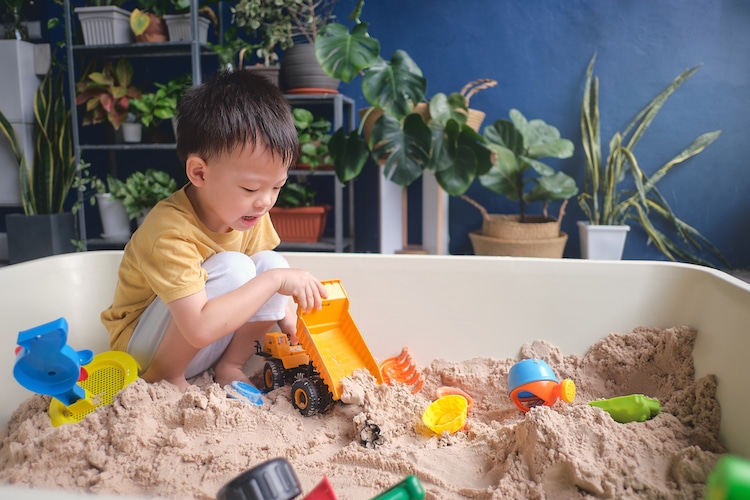Having kids is no picnic. Parents who work from home while taking care of theirs are especially aware of this. I don’t have kids myself, but I’m sure that getting them fed, bathed, and dressed in time for the school bus while managing the day’s workload must be a daily battle.
Throw in mandatory distance learning, and it becomes a whole different ball game. As a popular saying in the Philippines goes, #TheStruggleIsReal. Because while online learning is a great alternative to traditional schooling, it just isn’t the same. And it’s hard for everyone involved.
This is even tougher on kids with special needs and their parents. There’s a reason why special education teachers need to undergo additional training, and most parents aren’t equipped with such.
However, all is not lost. If you’re a WFH parent and you’ve got a kid with special needs, you might find some of the following tips useful at this time:
1. Routines are a godsend.

For many kids with special needs, routine is everything because it anchors them. This is why they find it especially hard to adjust to distance learning. The huge upheaval it entails is simply a lot to take in, and this can be overwhelming for most.
Obviously, you can’t replicate their school routine perfectly, but maintaining a semblance of structure helps. This can involve starting and ending school days at set times, setting up a work desk, and having your kid do their online learning in a designated area.
Which brings us to….
2. …as are designated school zones at home.

Having a classroom area at home can help your kid focus better. Why? It’s because this sort of environment is an important cue. Once they’re in the home classroom, it’s time to study.
If you don’t have enough space for a designated zone, a special placement at the kitchen table will do. The key thing here is to set up environmental cues to distinguish school time and regular time at home. (Sounds a lot like setting WFH boundaries, doesn’t it?)
3. Keep collaborating with your child’s special education teachers.

Continuously collaborate with your child’s teachers. Ask them for their lesson plans and consult with them about breaks, check-ins, and assessments.
Remember, teachers are a great resource for tips on continuing your kid’s education whether online or otherwise. Don’t be shy to ask them for help.
4. Try to mirror your child’s daily school schedule at home.

You can email your child’s school and ask for a copy of their usual schedules. Mirroring this at home will help give your kids a sense of normalcy and continuity.
However, do note that an eight-hour day at school is quite different from the same time period at home, where certain emergencies can occur. So, you can make adjustments when necessary, but keep the same sequence of events and activities whenever possible.
5. Incorporate regular breaks throughout the day.

Speaking of mirroring the school’s schedule, breaks are equally important. It’s hard enough for most kids to maintain a steady attention span for hours and hours, let alone amidst a global pandemic. So, give your kids time between subjects to reset and absorb information.
6. Equip your child with accessories or furniture that might help.

Sensory chairs, fidget toys, and noise-cancelling headphones are all useful for kids who have difficulty focusing. If your kid is on the spectrum, they might appreciate having an orderly desk, complete with a name tag, labeled books, and supplies. Those who need movement to focus, on the other hand, could benefit from a swivel or sensory chair.
7. Familiarize yourselves with one new person or one new thing at a time.

Allow yourself and your child enough time to get used to one teacher or one counselor before introducing others. You can also ask the school or the teachers if they have helpful resources that you can borrow or use at home.
8. Don’t be afraid to ask for help.

Apart from asking teachers or counselors, you can also join support groups online. There are numerous communities and groups on Facebook, for instance, that gather parents of children with special needs. All of them are valuable resources that can help you out, so don’t hesitate to reach out as needed.
9. Pattern learning activities around the things your child enjoys.

Be open to different ways of doing things. Screen learning, for instance, can come in handy these days. Educational Youtube channels, children’s books, and the right physical activities can all be just as useful as online lectures.
The key here is to use the right tools that your child will best appreciate. Some kids learn best through play, so pay attention to which toys and games yours responds to the most and figure out how to use it in their lessons.
10. Use if/then statements to get your child to complete tasks.

For instance, if your child finishes a page on their work book, then they get extra fifteen minutes of iPad time. This approach is easy to understand and requires very little effort on your part. You just need to find out which particular if/then statement is most effective for your child.
11. Give yourself grace. Plenty of it.

This is not a normal situation by any means. There will be days when things just won’t happen as planned, and that’s okay. It doesn’t make you any less of a good parent, nor will it make your child any less amazing.
Learn to pick your battles and don’t deprive yourself or your child of any little comforts that could make this more bearable. Try not to sweat the small stuff, so to speak. Above all, be patient with yourself and your child.
Know of any useful hacks for online learning? Keen on sharing your own experiences as a WFH parent of a child with special needs to help other parents? Feel free to comment below!

